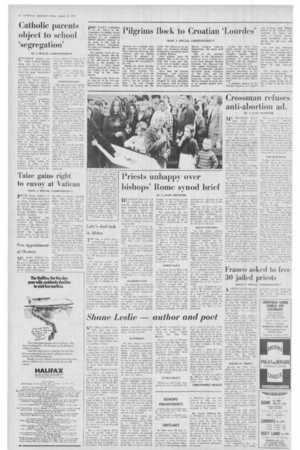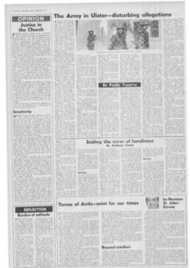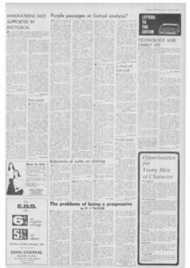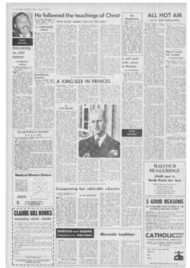Page 2, 20th August 1971
Page 2

Report an error
Noticed an error on this page?If you've noticed an error in this article please click here to report it.
Tags
Share
Related articles
Catholic Profiles: 351
Sir Shane Leslie
Sir Shane Leslie
Anthology Of Catholic Poets Front Sir Shane Leslie Sta.-i Am
Zulu King ' S Bracelet Is Returned Qir Shane Leslie Has Re'
Shane Leslie author and poet
SIR ,-Shane Leslie, horn in 1885. died last week aged 85. 1 lirst heard of him when I was up to (in the class of) Hugh McNaughtori, a minor poet and veteran classics teacher at Eton.
He told us one day that he would read out some 110CMS by a young man who had been in the same division (class) some years before, and he read us the poems, the only line of which I now recollect was one of some Irish soldiers who would
'Be tonight in Tipperary Town.'
I forget if lie told us the name of the poet, but I am sure that he did not tell us that he was a Catholic, he only told us that he was in the division at the same time as Ronald Knox, a man whose name had to the greatest degree survived the normal oblivion of leaving school.
Leslie was an ambivalent Anglo-lrishman. The son of a Protestant Irish landlord, Sir John Leslie of Glasborough, Co. Monaghan. he became a Catholic at Cambridge under the influence of Robert Hugh Benson, became a Nationalist and Nationalist parliamentary candidate for Derry, and all his life delighted in walking the streets in an Irish kilt and tam-o'-shanter.
But it was English streets that he usually walked. In spite of Irish origin and Irish nationalism he spent much more time in England than in Ireland. He had a nostalgia for the origins with which he bad broken, and perhaps a certain unease for the new society into which he had entered.
SUBMISSION
He had a liking for writing about ecclesiastics, and wrote the lives of Manning and Ullathorne — but was perhaps not wholly at home with their deeper problems. When he wrote of his own experiences he was at times too outspoken for some people's taste. It was an age when. in spite of Mr, Alec Waugh, it was considered the height of disloyalty to breathe one syllable of criticism of one's old school.
Some of the Eton masters in Leslie's "Oppidan" were ruthlessly — though as those who knew him had told me—quite fairly exposed, and old boys criticised his criticisms. The Oppidan sequel, "The Cantab," brought down on him an ecclesiastical censure for its too frank description of an illegal operation for abortion, but he met, as he put it so tactfully, so medieval a denunciation with a typical medieval submission, and retracted.
Much of his writing was autobiographical and comparatively casual, such as "End of a Chapter." "Passing Chapter," and "The Film of Memory," and he had no ambition to make himself a leader of thought. An amusing and colourful character. he was an amusing and colourful writer, but he was frankly more concerned to amuse and to startle than to correct. He had
an interest in historical curiosities, and so "George IV." "Skull of Swift," "Baron Corvo" and 'Mrs. FitzHerbert."
He was a cousin of Winston Churchill and like him, therefore, the son of an American mother, and he was a frequent visitor to that country. He especially befriended Scott FitzGerald and his wife.
In 1935 Fr. O'Hara (as he then was) afterwards Cardinal O'Hara of Philadelphia, then president of Notre Dame, had the plan to invite out to his campus visitors from this side of the Atlantic.
ECCENTRICITY Chesterton and Leslie were among the first, and Leslie left on the campus that was at that time too rigidly orthodox an agreeable reputation for eccentricity, being noted for going down to the pool to bathe in bare feet and with no socks, for refusing to drink beer, and for other examples of theological daring.
He had a liking for the colourful gesture and announced that he had written down the names of three of his pupils whom he prophesied would one day be among the great American writers and had sealed up their names in a cupboard which was only to be opened after 40 years.
The time is now very nearly up. Whether any of his prophecies have been fulfilled I cannot say.
blog comments powered by Disqus











